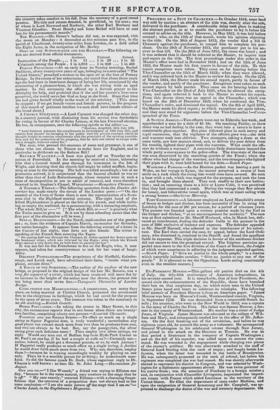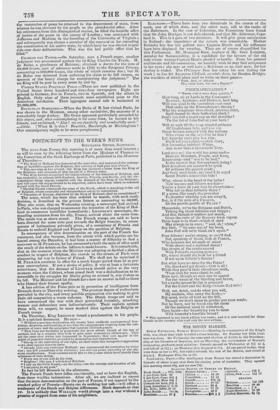EX..PRESIDENT MONROE.—This gallant old patriot died on the 4th of
July, the fifty-fifth anniversary of American independence, in his seventy-second year. It is remarkable, that of four Presidents, de- ceased since the commencement of the Republic, three have breathed their last on that auspicious day, on which every man in the United States joins hand and heart to celebrate its triumphs. The following brief memoir of President Monroe is from an American paper. "James Monroe was born on Monroe's Creek, Westmoreland county, Virginia, in September 1758. He was descended from a respectable Scotch fa. wily; his ancestor, who went to the New World in 1652, was a captain in the army of Charles the First. His father was Spence Monroe, a far. mer in the county of Westmoreland. His mother was a sister of Judge Jones, of Virginia. James Monroe was educated at the college of Wil- liam and Mary, and subsequently studied law in the office of Mr. Jeffer- son. On the first breaking out of the revolution, and before he was eighteen years old, he entered the army as a volunteer. He accompanied General Washington in his celebrated retreat through New Jersey, and joined in the attack on the Hessians at Trenton. He was at that period a lieutenant in the company of Captain Washington ; and on the fall of his superior, was called upon to assume the com- mand. He was wounded in the engagement while charging two pieces of the enemy's artillery. He was afterwards attached to the staff of General Lord Stirling with the rank of major; and fought beside La- fayette, when the latter was wounded in the battle of Brandywine. • He was subsequently promoted to the rank of colonel, but before his regiment was completed the war had ceased. He was shortly afterwards elected to represent his district in Congress, and was selected by Wash- ington for a diplomatic appointment abroad. He was twice governor of his native State ; was the associate of Pinckney in a foreign mission ; and, in conjunction with Chancellor Livingston, negotiated the import- ant treaty with France which added Louisiana to the territory of the United States. He filled the department of state under Madison, and upon the resignation of General Armstrong and Mr. Campbell, was ap- pointed to discharge the duties of the war and treasury departments. On the restoration of peace he returned to the. department of state, from whence he was elevated by the people to the presidential office. After his retirement from this distinguished station, he filled the humble office of justice of the peace in the county of London ; was associated with Jefferson and Madison in the founding of the University of Virginia ; and subsequently was chosen a member of the convention for amending the constitution of his native state, by which body he was elected to pre- side over their deliberations. This was the last public office that he filled."
CHARLES TIIE TENTH.—On Saturday, says a French paper, another judgment was pronounced against the ex-King Charles the Tenth. M. de Baltic, a gentleman of Brittany, obtained a decree for the sum of 50,000 francs, part of advances made in 1792 to the Emigrant Princes, amounting to 600,000 francs, the whole of which remains due ; but M. de Balue was deterred from enforcing his claim to its full extent, on account of the heavy charge for enregistering the judgment." The CE-King will be poor in every sense by and by.
Thermo STATES POLATIC.IL PRESS.—There are now published in the United States three hundred and sixty-four newspapers. Eight are printed in German, five in French, two in Spanish, and the others in English. Only nine of these journals were established prior to the American revolution. Their aggregate annual sale is estimated at 25,000,000. EFFECTS or SeateArne.—When the Duke of B. last visited Paris, he was shown in the Museum, among other curiosities, the anatomy of a remarkably large donkey. His Grace appeared particularly attracted by this object, and, after contemplating it for some time, he turned to his friends; and exclaimed, "Alas ! we are fearfully and wonderfully made." —Globe. [What B. is this ? Beaufort, Buccleugh, or Buckingham ? Our contemporary ought to be more perspicuous.]



























 Previous page
Previous page